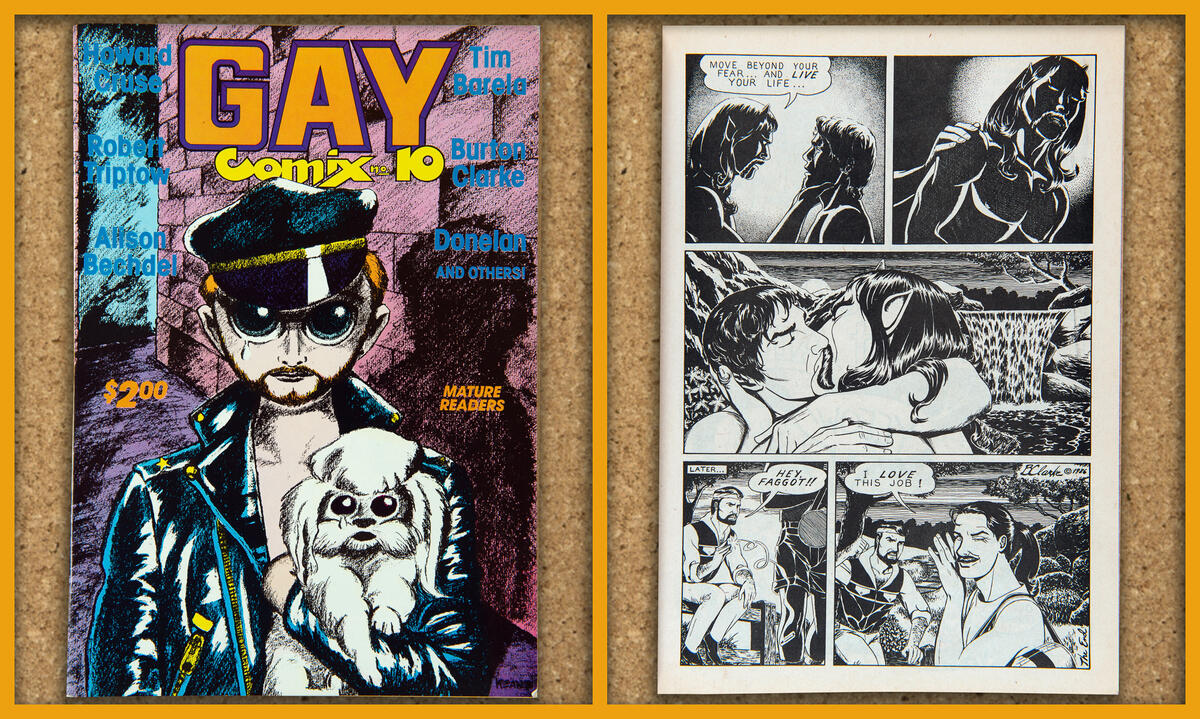
June 25, 2024
Comic book pride: In black and white and every color of the rainbow
Share this story
For three years running, the graphic memoir “Gender Queer” has been at the top of the American Library Association’s annual list of “most challenged books.” In the 2019 title, author Maia Kobabe describes, in both words and illustrations, the experience of grappling with gender identity and sexuality.
In Virginia Commonwealth University’s massive Comic Arts Collection – with more than 175,000 comics and artifacts, it is one of the largest in the nation – “Gender Queer” is among the many significant items that reflect the LGBTQIA+ community and its contributions to comics.
Still making headlines today, queer comics have a history going back more than 50 years, when they emerged during the underground comix movement of the 1960s and ’70s. At the time, mainstream comics were heavily restricted by the Comics Code Authority, a form of self-censorship that the Comics Magazine Association created in 1954 as a way for the industry to avoid government censorship.
Among the rules were “The treatment of live-romance stories shall emphasize the value of the home and the sanctity of marriage” and “Sex perversion or any inference to same is strictly forbidden,” implying that LGBTQIA+ characters and story lines would not be tolerated in mainstream comic publications. It wasn’t until the code was revised in 1989 that censorship of “sexual abnormalities” was lifted. Starting in the 1970s, queer comics found their way into readers’ hands as underground comix that were self-published or published by small presses. And by 2011, the Comics Code had died away completely.
Below, Katharine Buckley, Special Collections and Archives teaching and learning librarian at VCU Libraries, offers a window into the history of queer comics by highlighting significant items from VCU’s Comic Arts Collection.

“Ebon #1,” Larry Fuller, 1970.
Larry Fuller’s comic book “Ebon” is significant in comics history as the first titular Black superhero. Though there had been Black superheroes, including Black Panther, they played supporting roles or were featured in other series; Ebon was the first to be the central focus of his own comic book. Fuller himself was a Black, queer comic artist in the underground comix scene, which at the time was dominated by white male artists. He went on to push boundaries, creating publishing radical comics — including “Gay Heartthrobs,” the first issue of which is held in VCU Special Collections and Archives.

“Come Out Comix,” Mary Wings, 1974.
Written, drawn and self-published by Mary Wings, “Come Out Comix” represents the first comic book that fully centers itself on the lesbian experience. Wings created the comic book in response to a story that Trina Robbins had created in “Wimmen’s Comix” about coming out. Robbins was criticized for having written it as a straight woman and flattening the experience of coming out. “Come Out Comix” chronicles not only the experience of coming out but the aftermath of searching for community and finding love.

“Gay Comix #10,” Spring 1987.
Edited by Robert Triptow, published by Bob Ross
“Gay Comix” was an underground anthology series created by artist Howard Cruse and publisher Denis Kitchen in 1980 to give gay and lesbian comic artists the opportunity to publish their work and push back on stereotypes and caricatures of queer characters in comics. Cruse wanted to showcase work that presented the diversity of experience among the community. Contributors to “Gay Comix” include many prominent comic artists – issue #10 features work by Alison Bechdel, Robert Triptow, Tim Barela, Jeff Krell and Donelan.

“Doom Patrol #70” (“The Laughing Game”), September 1993.
This issue of “Doom Patrol” features the first appearance of a character named Coagula, the first trans superhero in a DC Comics entry and the first trans superhero written by a trans creator, Rachel Pollack. Pollack introduces Kate Godwin, a freelance programmer who has the power to liquify solids and solidify liquids and becomes the superhero Coagula. Unlike previous representations of trans characters in comics, Pollack writes her character with charm, intelligence and dignity. Throughout Pollack’s term writing for “Doom Patrol,” she explored complex themes of gender, bodily autonomy and sexuality.

“SubGurlz” (1999) and “Juicy Mother” (2005) by Jennifer Camper.
Jennifer Camper was one of the prominent lesbian comic artists publishing work in the 1990s, alongside Alison Bechdel and Diane DiMassa. Camper is Lebanese-American and sought to create comics that showed lesbians as adventurous, victorious, smart and multiracial. In an interview, she said her characters “ridicule their oppressors. They are proud and fearless.” “SubGurlz” is a book-length comic about three off-beat lesbian superheroes who live in the New York subway tunnels. “Juicy Mother” is a comic anthology, the next queer anthology since “Gay Comix,” with a focus on work by and about women and people of color. One of Camper’s comics is featured – entitled “Ramadan,” it is about the experiences of growing up Arab and queer.

“Queer: A Graphic History,” Meg-John Barker and Julia Scheele, 2016.
This nonfiction graphic novel dives into the history of queer theory and thought. Following in the rich tradition of using illustration to convey radical messaging, Meg-John Barker and Julia Scheele translate academic theory and criticism into an accessible visual study.

“I Am Only a Foreigner Because You Do Not Understand,” L. Nichols, 2023.
A recent acquisition in the VCU collection, “I Am Only a Foreigner Because You Do Not Understand” is a graphic memoir of L. Nichols’ reckoning with their trans identity alongside the pain of death, heartache and depression. Many vignettes tell a story that picks up where Nichols’ previous memoir, “Flocks,” leaves off, incorporating the same button-eyed doll imagery they evoked in their earlier work. Ultimately, Nichols’ story is one of immense tenderness and empathy, examining the ongoing journey of self-acceptance.
Subscribe to VCU News
Subscribe to VCU News at newsletter.vcu.edu and receive a selection of stories, videos, photos, news clips and event listings in your inbox.







